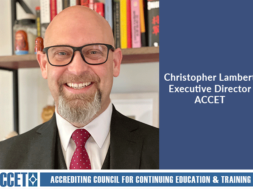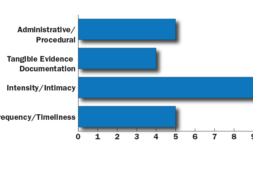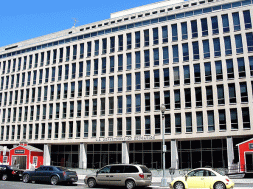
PAPSA/CSPEN Survey Finds That ACICS-Accredited School’s Still Hope for More Time and Support in Transition Process
By Tom Netting, Co-Executive Director, CSPEN and Aaron Shenck, Executive Director, PAPSA
In an effort to continue to support ACICS-accredited institutions, the Pennsylvania Association of Private School Administrators (PAPSA) and Central States Private Education Network (CSPEN) collaborated on the circulation of an anonymous survey seeking additional information and a status report on where ACICS-accredited schools are in the process of transitioning from ACICS to a different accrediting agency or agencies.
The survey, originally circulated prior to the favorable May 18, 2017 announcement from the U.S. Department of Education regarding the deadline for accrediting agency site visits, provided a wealth of information regarding not only where various institutions are in the process of transitioning to new accreditation, but also if those schools believed they would be able to complete the process with their new accrediting agency within the 18-month period provided to them by law, beginning on Dec. 12, 2016.
U.S. Department of Education responds favorably to accrediting agencies and institutional request for additional time to conduct site visits
On or around May 18, 2017, ACICS-accredited institutions received some good news for a change in the form of individual institutional letters from the U.S. Department of Education stating that in order “to allow recognized accreditors additional flexibility to assist ACICS-accredited institutions, the Department has decided to modify Condition #20 of the PPA Addendum for all signatory institutions.”
The Department went on to explain, “that Condition #20 formerly set a deadline for a site visit by an alternative recognized accreditor to occur on or before 300 calendar days from the Secretary’s Dec. 12, 2016, withdrawal of ACICS’s recognition (Oct. 12, 2017).”
It is important to note, “the Department has been contacted by several recognized accrediting agencies, requesting that the Department relax various deadlines in the PPA Addendum to facilitate their ability to review ACICS-accredited institutions that are seeking alternative recognized accreditation.”
The Department decided to issue new guidance stating that, “as of the date of this letter and going forward, condition 20 of the PPA Addendum for your institution and other ACICS-accredited institutions as modified provides as follows:
20. No Accrediting Agency Site Visit by Dec. 31, 2017. If the Institution has an In Process Application with an accrediting agency, but a site visit has not occurred by Dec. 31, 2017, all of the foregoing conditions will apply, even though the Institution had an In Process Application within the 90 day or 180 day periods set forth above. In the event that the site visit has not occurred by Dec. 31, 2017, all deadlines set forth in these provisions are immediately triggered, and must be complied with by Feb. 28, 2018.”
The favorable portion of the letter concluded with, “because the above modification eases rather than tightens Condition #20, your institution is not required to return an executed copy of this modification and it is automatically incorporated into your Provisional PPA. However, your institution should maintain a copy of this letter with its eligibility documents.”
Unfortunately, the letters also made it very clear that the Department does not have the authority to extend the 18-month deadline for compliance set in the PPA Addendum because it is statutory and appears unwilling to change any of the “other deadlines in the Addendum” because they “rely on the institution (not the accrediting agencies) to take the initiative and the Department believes (the deadlines) reflect appropriate protections for students and taxpayers.”
Survey results
The informal survey results found that a majority (62 percent) of the respondents believed there was no better than a 50 percent chance they would complete the process within the required timeframe. Only 38 percent thought the probability of completing the process on time was less than 50 percent.
Prior to the recent announcement from the Department that provided ACICS-schools some initial relief in the timeline, a full three-quarters of the respondents stated they believed the transitional process was placing considerable pressure on the various accrediting agencies to complete the process by the original October 2017 deadline.
Of those who responded, an overwhelming majority felt both institutions and the accrediting agencies they are in the process of seeking to become accredited by, would benefit from more time. Here is a breakdown of just how much time the respondent schools recommended would be helpful:
- 6 percent recommended that the process would benefit from three additional months;
- 31 percent recommend an additional six months;
- 19 percent recommended an additional nine months;
- 33 percent recommended an additional 12 months; and
- 11 percent recommended more than a year to complete the process.
In addition, institutions shared specific information and concerns related to programmatic accreditation, state agencies and the federal agencies roles as schools navigate the transition process in this unprecedented situation.
While the issues and concerns varied, a major theme of the comments was the inconsistency in the interpretation of “recognized accredited status” by the various entities and the interpretation of the Department of Education’s information and guidance related to both institutions “and students” eligibility during the transitional process.
Given the insights obtained from the survey, PAPSA and CSPEN have begun to share the survey’s findings with elected officials on Capitol Hill through email, meetings and other conversations, and are in the process of developing letters – similar to those already submitted by national accrediting agencies like the Accrediting Bureau of Health Education Schools (ABHES) and the Accrediting Council for Continuing Education and Training (ACCET) – which were going to be sent to the Hill when the recent May 18 guidance came out.
Based upon the May institutional letters, and the survey results, PAPSA and CSPEN will soon be providing additional information to both the Administration and Congress in the hopes that the survey results will continue to not only inform them of the remaining concerns of the schools, but also help guide these federal entities as they continue to make decisions important to these schools that have been impacted by this unprecedented situation.
The initial offices with whom this information has been shared with have expressed interest in helping address some of the concerns – either through revisions at the Federal Agency level (e.g., additional steps by the Department of Education to further modify both the guidance and requirements of the Provisional Program Participation Agreement and/or modifications to the Department of Homeland Security’s U.S. Immigration and Custom Enforcements repeal of institutions certification) and/or the possibility of future statutory revisions extending the current 18-month transitional period.
For more information on the survey and other steps that are being taken in support of ACICS-accredited institutions in the process of transitioning to another accrediting agency or agencies, both CSPEN and PAPSA will be providing updates and other information at their annual summer conferences. If you are interested in attending either conference, here are the dates:
- PAPSA’s 2017 Annual Conference, July 26-27, 2017 in Philadelphia, PA; and
- CSPEN’s Annual Conference, Aug. 16-18, 2017 in Minneapolis/St. Paul, MN.
For further information, questions and conference information you can contact Aaron Shenck, Executive Director of PAPSA at Aaron@papsa.org or Tom Netting, Co-Executive Director of CSPEN at Tom@centralstatesedu.com.
TOM NETTING has more than 28 years of experience working in government relations and public policy on matters involving higher education and workforce development, elementary and secondary education, healthcare, veterans affairs and the procurement of federal appropriations. Having spent his entire professional career either assessing institutions compliance with accreditation standards, implementing revisions to the Higher Education Act of 1965, as amended at the institutional level, or most often advocating on behalf of students and schools throughout the last three, and now actively engaged in advocacy on his fourth reauthorization of HEA, Tom’s passion is working to ensure that the process is fair and equitable for all stakeholders be they students, institutions, vendors, or the taxpayers.
Contact Information: Tom Netting // Co-Executive Director // CSPEN // 202-824-1724 // Tom@centralstatesedu.com // http://centralstatesedu.com
AARON SHENCK has been the Executive Director of PAPSA since October 2014. He previously worked as the Director of Government Relations and Legislative Affairs at the Pennsylvania Department of Education, several years in a senior position in the Office of the Governor of Pennsylvania, was the former Director of the Pennsylvania State Senate Education, a staffer in the Pennsylvania State House of Representatives, and interned for two years with U.S. Congress. He holds a BA in Political Science from Millersville University and a Master’s in Government Administration from Penn State.
[/vc_row]
Contact Information: Aaron Shenck // Executive Director // PAPSA // 717-540-9010 // Aaron@papsa.org // https://papsa.org












